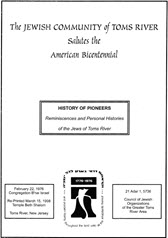HEINZ J. GUENZBURGER FAMILY
It seems odd that by now I am an old timer in this area and would be asked to write how I found things in Ocean County at the end of the thirties, and what made me come here in the first place. I really don't feel like an old timer.
I first visited Toms River on my way to my American relatives in Chicago after my cousin Margot Pfaelzer, now Mayer, and I arrived in this country. Actually we had stopped here to visit various relatives and acquaintances of our parents, also victims of the Nazi persecution in Germany. We were to explore the possibility of our parents settling here on a chicken farm when they were able to leave Germany in a year or so. Our parents had the foresight to see that sooner or later war would break out, and they wanted their children to get out before it was too late. We had already sweated out the "Anschluss" and the crises over the Sudetenland.
As it was, I came to this country against my wishes. In my youthful enthusiasm , I wanted to go to Palestine more than anything else. However, in those days long ago, children listened to their parents, especially when the parents feared they could not earn a livelihood at their age in Palestine. Economic conditions were not rosy there in those days either.
For two years before leaving Germany, I had training at cabinet making in a trade school organized by the Jewish community of Mannheim. With my background, I was able to find work in a Chicago furniture factory. I had to do production work which I hated. When our parents jo ined us the following year, and could not find work , it was easy for us to decide to move back east to try to make a living on a chicken farm. My uncle did the scouting around for a suitable farm and he found a place containing 13 acres of land, some neglected chicken coops and two residences not much better. The layout seemed perfect for two families with limited means. The price tag was $7,000. which we were able to swing with the help of one of our rich relatives.
We arrived here in the summer of 1939 and got busy making the buildings fit for human habitation. The purchase of several hundred chickens put us into the egg business. If you think the idea of having to care for hundreds of live creatures was scary, you are right. What helped the beginners was a vast amount of free advice, both good and bad, available from fellow farmers . Also in the early days, one could not afford help. We helped each other out when the task required more than one family's man and woman power. For instance, we and the Plauts always helped each other when the big round up for housing chickens came in the fall. We actually had fun doing that.
I remember we spent the first fall and winter pulling thousands of nails from second hand boards. We used the boards for building brooder houses in which we would raise our own baby chicks the following spring.
Life was quite primitive. I remember for instance, we had hot water only Friday afternoons when we lit our little coal hot water heater. We did not spend much money for groceries. Chicken and eggs were the main ingredients of our diet. My mother grew all our vegetables and was proud of the money she took in from the sale of the surplus. Pleasures were simple. Services were available in the Jewish Community House only on holidays. On the other hand, on Shabbat the only work we did was feeding the chickens and collecting eggs, which had to be done.
After the first year we were able to get a loan from the "Jewish Agricultural Society" to build more coops to increase the farm's capacity to a point considered necessary to support two families. The contractor we selected was Benny Wexler , who gave me a job with the carpentry crew at $2.50 a day. From there on, I worked on the farm only in my spare time.
Everything seemed to be working out well for us in our new homeland, except that in Europe, Hitler was taking over and might eventually follow us here. It almost seemed a relief when America became involved in the struggle. It was great news for me when I received "Greetings from the President".
After my return from the war, conditions here changed rapidly. We foresaw it would become harder and harder to make a living on a chicken farm. It was decided I go out on my own doing cabinet work.
"Castle Woodcraft" celebrates its 30th anniversary in this year of the Bicentennial. I suppose this makes me an old timer after all.
